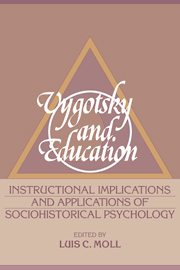Book contents
- Frontmatter
- Contents
- List of contributors
- Preface
- Acknowledgments
- Introduction
- Part I Historical and theoretical issues
- 1 Vygotsky: The man and his cause
- 2 The historical context of Vygotsky's work: A sociohistorical approach
- 3 Cognitive development and formal schooling: The evidence from cross-cultural research
- 4 The voice of rationality in a sociocultural approach to mind
- 5 The social origins of self-regulation
- 6 Vygotsky, the zone of proximal development, and peer collaboration: Implications for classroom practice
- Part II Educational implications
- Part III Instructional applications
- Name index
- Subject index
5 - The social origins of self-regulation
Published online by Cambridge University Press: 05 June 2012
- Frontmatter
- Contents
- List of contributors
- Preface
- Acknowledgments
- Introduction
- Part I Historical and theoretical issues
- 1 Vygotsky: The man and his cause
- 2 The historical context of Vygotsky's work: A sociohistorical approach
- 3 Cognitive development and formal schooling: The evidence from cross-cultural research
- 4 The voice of rationality in a sociocultural approach to mind
- 5 The social origins of self-regulation
- 6 Vygotsky, the zone of proximal development, and peer collaboration: Implications for classroom practice
- Part II Educational implications
- Part III Instructional applications
- Name index
- Subject index
Summary
A central theme in Vygotsky's development theory is that cognitive development can be understood as the transformation of basic, biologically determined processes into higher psychological functions. According to the theory, the human child is endowed by nature with a wide range of perceptual, attentional, and memory capacities, such as the capacity to perceive contrast and movement, the capacity for eidetic memory, and arousal/habituation responses to environmental stimuli, to name a few. Such basic processes (also referred to by Vygotsky as “biological,” “natural,” or “elementary”), however, are substantially transformed in the context of socialization and education, particularly through the use of language, to constitute the higher psychological functions or the unique forms of human cognition.
Our readings of Vygotsky suggest that this “transformation” from basic to higher functions consists mostly of an increasing self-regulation of processes and capacities that are originally bound to and controlled by the concrete, immediate stimulus field. In development, the infant's eidetic, rudimentary memory processes are gradually transformed into the capacity for voluntary memory and the use of mnemonic strategies; the capacity to perceive salient stimulus features develops into the capacity for selective attention; arousal/habituation patterns develop into the capacity for vigilance, concentration, and sustained attention. The common denominators of these transformations or developmental changes are the decreasing power of immediate environmental contingencies and the increasing role of self-formulated plans and goals in the regulation of behavior and cognitive activity.
- Type
- Chapter
- Information
- Vygotsky and EducationInstructional Implications and Applications of Sociohistorical Psychology, pp. 127 - 154Publisher: Cambridge University PressPrint publication year: 1990
- 74
- Cited by



